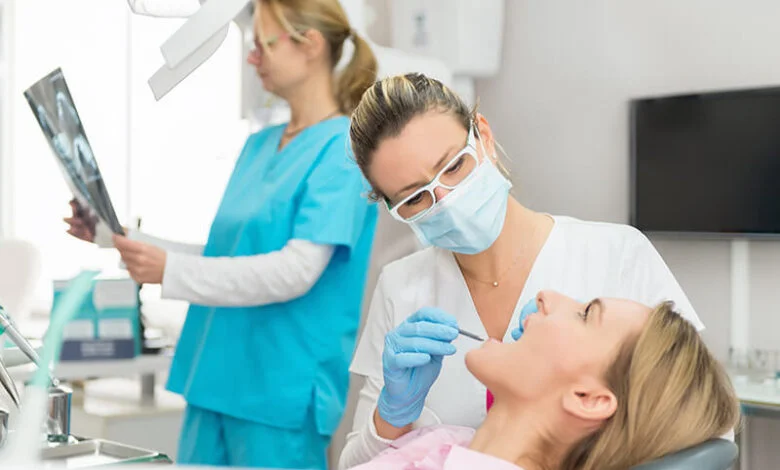Newssyc.in/category/dental Ultimate Guide to Preventive Dental Care and Tips

Welcome to the world of preventive dental care, where maintaining a radiant smile is just as crucial as having one. Many people underestimate the importance of keeping their teeth healthy until they face an issue that could have easily been avoided. Imagine strolling through life with confidence, knowing your oral health is in check!
Preventive dental care goes beyond brushing and flossing; it’s about taking proactive steps to ensure your mouth stays in top shape for years to come. From regular visits to the dentist to being mindful of what you eat, there are many ways to keep those pearly whites shining bright.
In this ultimate guide, we’ll explore every aspect of preventive dental care—from understanding why routine check-ups matter, identifying common issues that can arise if neglected, and sharing practical tips for at-home oral hygiene routines. Get ready to take charge of your dental health like never before!
Importance of Regular Dental Check-Ups
Regular dental check-ups play a crucial role in maintaining oral health. These visits allow your dentist to identify potential issues before they escalate. Catching problems early can save you time, money, and discomfort down the road.
During these appointments, professionals conduct thorough examinations of your teeth and gums. They also take X-rays when necessary to detect hidden cavities or bone loss. This proactive approach helps prevent serious complications later on.
Additionally, routine cleanings remove plaque and tartar buildup that brushing alone can’t eliminate. This aids in preventing gum disease—a common issue that can lead to tooth loss if left untreated.
Beyond physical health benefits, regular visits foster better relationships with dental professionals. Feeling comfortable at the dentist’s office makes it easier to discuss concerns about your oral hygiene or treatment options without hesitation.
Common Dental Issues and How to Avoid Them
Dental issues can sneak up on anyone, but many are preventable with the right care. Cavities are one of the most common problems. They occur when plaque builds up and acid eats away at tooth enamel. Regular brushing and flossing can help keep cavities at bay.
Gum disease is another major concern. It starts with gingivitis, leading to inflammation and bleeding gums if left unchecked. Daily oral hygiene routines and routine dental visits play a crucial role in prevention.
Tooth sensitivity affects many people, often caused by worn enamel or gum recession. Using toothpaste designed for sensitive teeth can provide relief while protecting your smile.
Grinding teeth—often linked to stress—can lead to severe wear over time. Stress management techniques may help mitigate this issue, along with wearing a nightguard during sleep.
Tips for At-Home Oral Hygiene
Maintaining good oral hygiene at home is essential for a bright smile and overall health. Start with the basics: brush your teeth twice daily using fluoride toothpaste. Ensure you’re brushing for at least two minutes each time to effectively remove plaque.
Don’t forget about flossing! It’s crucial for cleaning between teeth where your toothbrush can’t reach. Aim to floss once a day, making it part of your routine.
Rinsing with an antibacterial mouthwash can further help eliminate bacteria and freshen breath. Look for products that are ADA-approved for added assurance.
Replace your toothbrush every three months or sooner if the bristles fray. A worn-out brush won’t clean effectively.
Consider incorporating dental tools like interdental brushes or rubber tip stimulators to enhance your technique and keep gums healthy. Each small step contributes to achieving optimal oral health right from the comfort of home.
The Role of Diet in Maintaining Good Oral Health
What you eat plays a crucial role in your oral health. A balanced diet rich in vitamins and minerals supports strong teeth and gums. Foods high in calcium, like dairy products, help maintain tooth structure.
Fruits and vegetables are essential too. Crunchy options like apples can naturally clean teeth while providing nutrients. Fiber boosts saliva production, which neutralizes acids from bacteria.
On the flip side, sugary snacks can lead to cavities. When sugar interacts with bacteria in your mouth, it produces acid that erodes enamel over time. Limiting these treats is vital for maintaining a healthy smile.
Hydration matters as well. Water helps wash away food particles and keeps your mouth moist, reducing the risk of decay. Incorporating healthier choices into meals can significantly impact long-term dental health without sacrificing flavor or enjoyment.
The Benefits of Professional Cleanings and Treatments
Professional dental cleanings offer a level of care that at-home routines can’t match. During these appointments, dental hygienists remove plaque and tartar buildup that regular brushing often misses.
These cleanings also help prevent gum disease. By addressing issues early, you reduce the risk of more serious complications down the line.
Moreover, professional treatments improve your smile’s appearance. Stains from food or beverages fade away under expert care, leaving you with a brighter grin.
Your dentist may also spot potential problems during these visits. Early detection allows for timely interventions, saving both time and money in the long run.
Professional cleanings provide peace of mind. Knowing you’re taking proactive steps towards your oral health fosters confidence and promotes better habits between visits.
Innovative Technologies and Techniques for Preventive Dental Care
The landscape of preventive dental care is evolving rapidly, thanks to innovative technologies. One standout advancement is the use of digital imaging. This allows for precise diagnosis and better treatment planning without exposing patients to excessive radiation.
Another game-changer is tele-dentistry. Patients can now consult with their dentists remotely, making it easier to address concerns from home and receive guidance on oral hygiene practices.
3D printing has also made its mark in dentistry. It enables the quick production of custom dental appliances, like mouthguards or aligners, tailored for individual needs.
Moreover, AI-driven tools are being integrated into diagnostic processes. These systems analyze data more efficiently than ever before, helping practitioners identify potential issues early on.
These technologies not only enhance patient experience but also promote proactive approaches toward maintaining optimal oral health long-term. Embracing these advancements makes preventive care more effective and accessible than ever before.
Conclusion: Taking Control of Your Dental Health
Taking control of your dental health is a proactive journey that pays off in the long run. By embracing preventive dental care, you are setting yourself up for a lifetime of healthy smiles. Regular check-ups and professional cleanings ensure that any potential issues are caught early, saving you time and money down the road.
At-home oral hygiene plays an equally vital role. Brushing twice daily, flossing regularly, and using mouthwash can significantly reduce your risk of cavities and gum disease. Pair these habits with a balanced diet rich in vitamins and minerals to support not just your teeth but overall well-being.
Innovative technologies like digital x-rays or laser treatments make preventive care more effective than ever before. Stay informed about advancements in dentistry to maximize your oral health strategy.
Remember that taking charge means being proactive rather than reactive when it comes to dental care. The choices you make today shape the future of your smile tomorrow—a commitment worth making for both aesthetic appeal and health benefits alike. Embrace this path toward optimal dental wellness by prioritizing prevention every step of the way.




